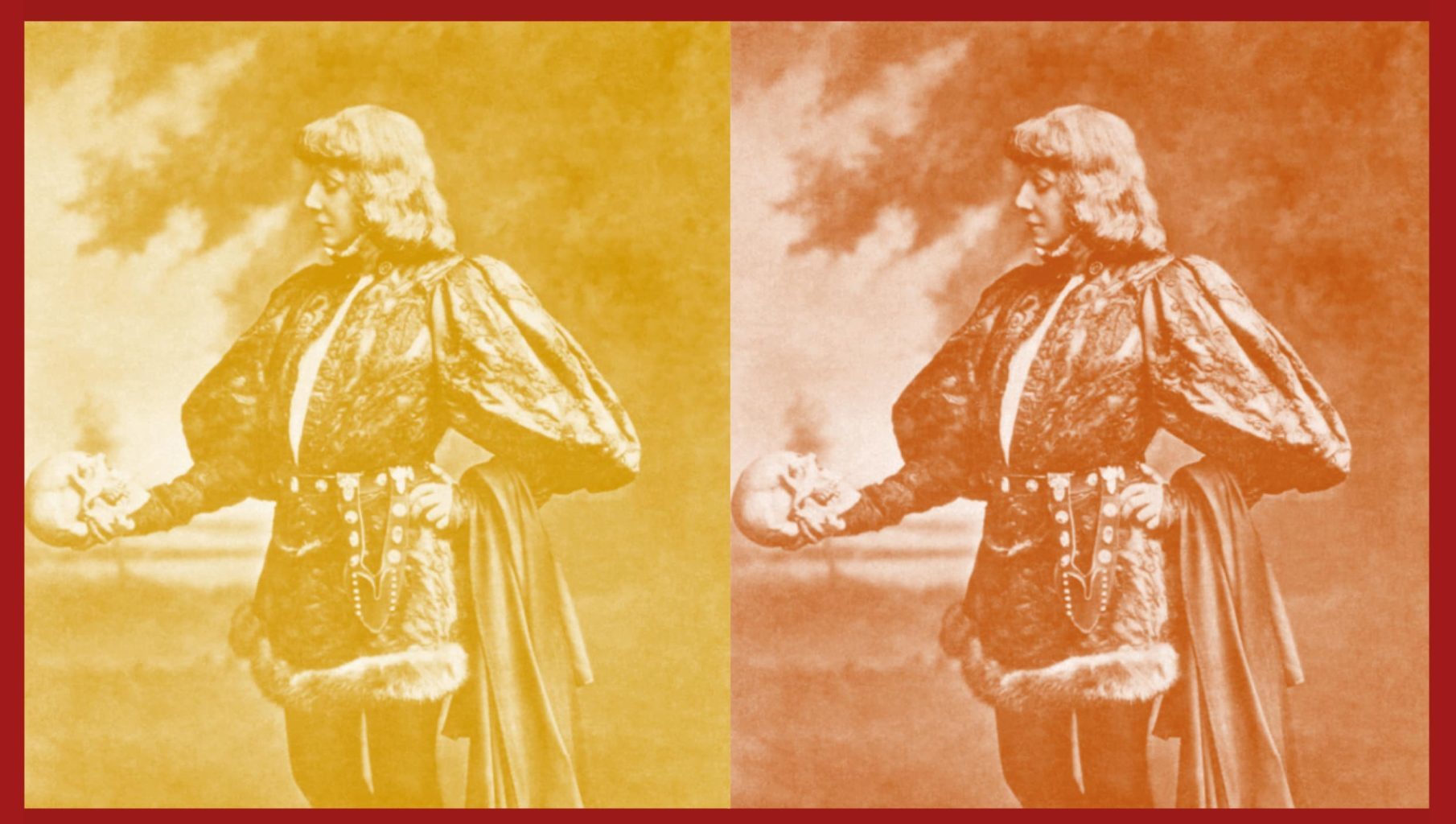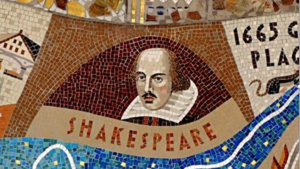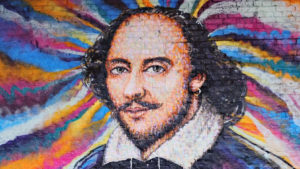“Shake Shakespeare up!: Adapting and Staging”
22 February – 29 March 2021
The “Shake Shakespeare up!: Adapting and Staging” workshop aims at introducing students to practices of adaptation of Shakespeare for the contemporary stage as well as for different media and genres, having in mind a transition from an academic, text-driven approach, to a broad understanding of adaptation as a collaborative and dynamic process. Guided by the idea of rearranging, appropriating, ‘shaking up’ Shakespeare’s text, the workshop wishes to inspire students to freely engage with it and get acquainted with contemporary theatre-making practices as well as experiments of multimedia adaptation, including translation, dramaturgy, and rehearsal as inextricably entwined in view of the performance. By nourishing the idea of adaptation as interpretation but also mis-understanding, students will be encouraged to test their creative initiative actively. Also, they will be critically equipped to discuss the politics of ownership and authorship vis-a-vis the vitality of action in theatre. Thus, the idea of ‘shaking up’ the academic knowledge they already have is meant to stimulate new and inventive approaches to Shakespeare.
Programme description:
The workshop combines two main approaches. Firstly, it will deal with concepts of adaptation in general and adaptation of Shakespeare theoretically, by discussing the role of the dramaturg in contemporary theatre practices as well as of translation for the theatre, but also examining intermedial issues. This part of the course aims at introducing and analysing concrete examples of adaptation as springboards for exploring the conceptual premises and methods of such practices. The second part consists of a more practical approach. Students will have the opportunity to try their hands at adapting a few scenes from Shakespeare’s plays, and will be encouraged to pursue their own vision building on their accumulated academic knowledge but also in view of an imagined audience. Students will be offered the opportunity to attend lectures and take active part in classes held by experts from Queen Mary University of London, the Guildford School of Acting of Surrey University, as well as by the Art Director of the Verona Teatro Nuovo.
Workshop outline:
- Duration: from 22 February to 29 March
- 3 CFU credits
- 18hs of lectures of three academic hours each (Monday 3 pm – 5.15 pm)
- A small group of up to fifteen students
- Language: English and Italian
- Online and/or onsite
Workshop leaders:
Prof. Silvia Bigliazzi (https://www.dlls.univr.it/?ent=persona&id=4617&lang=en)
Prof. Sidia Fiorato (https://www.dlls.univr.it/?ent=persona&id=2187&lang=en)
Workshop teaching team:
Dott. Valentina Adami, Dott. Petra Bjelica, Dott. Emanuel Stelzer, Dott. Roberta Zanoni.
Lectures and seminars:
Petra Bjelica is an early-stage researcher and PhD student at the Department of Foreign Languages and Linguistics at the University of Verona. As a Marie Skłodowska-Curie fellow, she is currently working on a thesis about Shakespeare’s Hamlet as one of the sources for Dostoevsky’s Stavrogin from Demons. The main areas of her research include comparative literature and theory of literature, as well as Shakespeare and Dostoevsky studies.
In the “Shake Shakespeare up!: Adapting and Staging” workshop, Petra Bjelica will give a lecture about the theories of adaptation and the role of a dramaturg, both in general terms and in regards to Shakespearean adaptations. Students will be introduced to various examples of adapting the Shakespearean text, with a particular focus on reworkings that are not intended to be ‘faithful’. The lecture aims to theoretically and critically set the stage for awakening the students’ creativity in its practical part.
- Elena Pellone (Shakespeare Institute) is a professional actor and scholar and the Artistic Facilitator of the Venice Shakespeare Company and Anərkē Shakespeare. She appeared as Nerissa in the historic Merchant of Venice, in the Venetian Jewish Ghetto 2016. She has toured London and Germany in the title role of Richard II, played Beatrice and Dogberry in Venice 2018, Lady Macbeth in London and Stratford-upon-Avon in 2020 and is due to direct Othello in Venice 2021. She had her West End debut in the world premiere of ¬Phaedra I in 2019, and recently appeared as Hecuba in Trojan Women at the Holy Trinity Church, Stratford upon Avon. Elena is a theatre reviewer for the Journal Shakespeare.
- Workshop Proposal: Elena Pellone will offer a series of workshops and seminars on performing Shakespeare in adaptation. This will cover the Compagnia de’ Colombari’s adaptation of Merchant in Venice for the 2016 historic production in the Venetian Ghetto, and Anərkē Shakespeare’s directorless productions of Macbeth and Richard II in th e UK. Joined by David Schalkwyk, there will also be a presentation on a multilingual adaptation of Antony and Cleopatra exploring fluidity of identity, the politics of empire and power, questions of race and gender, sexuality, desire and jealousy. Elena Pellone will conduct a master class in Shakespearean verse speaking.
- Dr Paolo Valerio (Art Director – Teatro Nuovo, Verona):
Emanuel Stelzer is a postdoctoral researcher at the University of Verona. He is the author of Portraits in Early Modern English Drama: Visual Culture, Play-Texts, and Performances (Routledge, 2019) and of a number of essays in edited volumes. His articles have appeared in journals including Critical Survey, Early Theatre, The Journal of English and Germanic Philology, English Studies, Notes and Queries, and The Huntington Library Quarterly. His main interests are early modern English literature and drama, textual studies, and theatre history, with a particular interest in the connections between textuality and visual and material culture. His work on William Sampson has earned him the Huntington Library Quarterly Centennial Essay Prize; he has also translated into Italian Philip Massinger’s The Picture (Aracne, 2017) and John Milton’s Comus (ETS, 2020). Dr Stelzer is managing editor of Skenè: Journal of Theatre and Drama Studies.
For the “Shake Shakespeare Up!” workshop, Dr Stelzer will introduce students to the phenomenon of ‘dialectal’ Shakespeare: translations and adaptations of Shakespeare’s plays written in one of the many Italian dialects. The discussion will investigate questions related to ideological aims, performability, and intended spectatorship. Case studies will include Eduardo De Filippo’s Neapolitan translation of The Tempest (Einaudi, 1984), Andrea Camilleri and Giuseppe Dipasquale’s translation in Sicilian dialect of Much Ado About Nothing (Lombardi, 2009), and Piermario Vescovo’s Paduan adaptation of The Taming of the Shrew (Elzeviro, 2009).
- Dr Jaq Bessell (Guildford School of Acting, Surrey University): Jaq Bessell is a stage director and actor trainer. She began her career at the Guthrie Theater in Minneapolis, and was the Head of Research at Shakespeare’s Globe in London under Mark Rylance’s tenure as Artistic Director. She has directed plays by Shakespeare in New York, London, and in regional theatres across the USA, UK and Europe. Jaq is currently a Principal Teaching Fellow at the Guildford School of Acting, University of Surrey, where she is Programme Leader for MA and MFA Acting. She is the author of Shakespeare in Action for Arden Shakespeare (https://skenejournal.skeneproject.it/index.php/JTDS/article/view/269/254).
- Practical seminar: Modern conservatoires are preparing the next generation of classical actors, but how do they adapt when the theatres are closed? Taking Hamlet’s famous quote ‘I could be bounded in a nutshell, and count myself a king of infinite space’, the workshops will offer students a practical, embodied approach to rehearsing Shakespeare under lockdown conditions, using an approach which blends an understanding of early modern theatre technology with contemporary physical theatre actor training techniques, now adapted for video conferencing software and hybrid learning. A few memorised lines of Shakespeare are essential, but no prior performance experience is required.
- Prof. David Schalkwyk (Queen Mary University of London): David Schalkwyk is Director for the Centre for Global Shakespeares at QMUL. His publications include studies on Wittgenstein, Literature and the Touch of the Real(Delaware, 2004) and Bachtin, Words in the World: The Bakhtin Circle (Skenè, 2016), as well as many contributions on Shakespeare, from Speech and Performance in Shakespeare’s Sonnets and Plays (Cambridge, 2002), to Shakespeare, Love and Service (Cambridge, 2008), Shakespeare, Love and Language (Cambridge, 2019), and, on Prison Shakespeare, Hamlet’s Dreams: The Robben Island Shakespeare (Bloomsbury, 2013). He is the co-editor of The Oxford Handbook of Shakespearean Tragedy (2018), the Cambridge Companion to Shakespeare and Language (2019), as well as General Editor of the Arden Series “Global Shakespeare Inverted”.
https://www.qmul.ac.uk/sed/staff/schalkwykd.html
Roberta Zanoni is adjunct professor of English at the universities of Verona and Bolzano. She owns a Phd in English Literature with a thesis on Shakespeare and Advertising, based on the appropriation by contemporary advertising of the figure and plays of Shakespeare. Her research focuses on the analysis of the intertextual relations existing between Shakespeare and previous and Early Modern texts as well as with popular culture and new media. Her research is influenced by film, translation, appropriation and adaptation studies. She has recently co-edited the volume Bestiarium: Human and Animal Representations, and published the paper “Harry Potter and Monstrous Diversity. The Brexit Case” in Monsters and Monstrosity. She is part of the Skenè Research Centre, of which she is web administrator, and for which se is currently working at the elaboration of the web platform for the SENS (Shakespeare European Narrative Sources) digital archive.
Roberta Zanoni will introduce the students to critical approaches to Shakespeare and Advertising, and will offer a workshop which will allow the participants to create advertising images and presentations with a Shakespearean theme. The participants will be divided into small groups and will be able to experiment firsthand processes of adaptation of some aspects of Shakespeare’s plays in view of the commercial promotion of goods. The workshop will allow the participants to explore some of the most interesting strategies of Shakespeare adverstising adaptation.
Valentina Adami is a Post-Doc Research Assistant of English literature at the University of Verona, and Adjunct Professor of English Language at the Free University of Bolzano/Bozen, Italy. She holds a PhD in English Studies (University of Verona, 2010). Her main fields of research are literature and trauma; law, literature and culture; ecolinguistics and ecocriticism.
In this lecture, Valentina Adami will analyse Margaret Atwood’s novel Hag-Seed (2016), a rewriting of Shakespeare’s The Tempest in narrative form, which is at the same time an adaptation, an appropriation, a reworking, and a revision of Shakespeare’s play. The title Hag-Seed comes from one of the insults hurled by Prospero at Caliban, but the novel actually goes against the traditional postcolonial focus on Caliban’s perspective: the protagonist is Felix/Prospero, the eccentric artistic director of a Shakespearean Festival in present-day Canada, who loses his job and plots his revenge, which will take place through a performance of The Tempest at a local correctional centre.
Learning outcomes::
At the end of the workshop students will
- be knowledgeable about the concept of adaptation and Shakespearean adaptation;
- be familiar with contemporary practices in adapting Shakespeare for the stage and in different media;
- be able to use critical knowledge of Shakespearean theatre in creating a Shakespearean adaptation for a contemporary audience.
Evaluation method:
Students are required to write a 5,000-word critical paper or to produce an adaptation of selected portions of a Shakespearean drama.
Selected References:
Albanese, Denise. 2010. Extramural Shakespeare. Basingstoke: Palgrave Macmillan.
Barba, Eugenio. 2009. On Directing and Dramaturgy: Burning the House. 1st ed. Routledge. https://doi.org/10.4324/9780203870297.
Bigliazzi, Silvia, Peter Kofler and Paola Ambrosi eds. 2013. Theatre Translation in Performance. London and New York: Routledge.
Bradley, Lynne. Adapting King Lear for the Stage. Farnham, Surrey, England; Burlington, VT: Ashgate, 2010.
Calbi, Maurizio. 2013. Spectral Shakespeares: Media Adaptations in the Twenty-First Century. Reproducing Shakespeare: New Studies in Adaptation and Appropriation. New York, NY: Palgrave Macmillan.
Cronin, Bernadette, Rachel MagShamhráin, and Nikolai Preuschoff, eds. 2020. Adaptation Considered as a Collaborative Art: Process and Practice. Cham: Springer International Publishing. https://doi.org/10.1007/978-3-030-25161-1.
Eckersall, Peter, Helena Grehan, and Edward Scheer. 2017. New Media Dramaturgy. London: Palgrave Macmillan UK. https://doi.org/10.1057/978-1-137-55604-2.
Huang, Alexa, and Elizabeth Rivlin, eds. 2014. Shakespeare and the Ethics of Appropriation. New York: Palgrave Macmillan US. https://doi.org/10.1057/9781137375773.
Hutcheon, Linda, and Siobhan O’Flynn. 2013.A Theory of Adaptation. 2nd ed. London; New York: Routledge.
Kidnie, Margaret Jane. 2009. Shakespeare and the Problem of Adaptation. 1st ed. London; New York: Routledge.
Komporaly, Jozefina. 2017. Radical Revival as Adaptation. London: Palgrave Macmillan UK. https://doi.org/10.1057/978-1-137-48102-3.
Martin, Carol, ed. Dramaturgy of the Real on the World Stage. 2010. London: Palgrave Macmillan UK. https://doi.org/10.1057/9780230251311.
Pope, Johnathan H. 2020. Shakespeare’s Fans: Adapting the Bard in the Age of Media Fandom. Cham: Springer International Publishing. https://doi.org/10.1007/978-3-030-33726-1.
Reilly, Kara, ed. 2018. Contemporary Approaches to Adaptation in Theatre. London: Palgrave Macmillan UK. https://doi.org/10.1057/978-1-137-59783-0.
Romanska, Magda, ed. 2015. The Routledge Companion to Dramaturgy. London; New York: Routledge.
Ryle, Simon. 2014. Shakespeare, Cinema and Desire. London: Palgrave Macmillan UK. https://doi.org/10.1057/9781137332066.
Turner, Cathy, and Synne K. Behrndt. 2008. Dramaturgy and Performance. Theatre and Performance Practices. Basingstoke; New York: Palgrave Macmillan.



